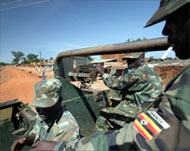UN deplores northern Uganda conflict
The desperate situation in war-torn northern Uganda is an example of the worst form of terrorism, according to the UN’s humanitarian relief co-ordinator.

Jan Egeland, on a visit to refugee camps in Patongo, 400km north of the capital Kampala, also called for action to end the humanitarian suffering.
“Conditions here are totally unacceptable. It has to change because people have to live a better life and have a better future,” he said.
For the past 20 years, northern Uganda has been a battleground between government forces and the Lord’s Resistance Army, who have terrorised civilians and are blamed for forcing millions of people out of their homes in addition to abducting children for combat and as sex slaves.
Egeland said security needed to be provided for 40,000 refugees at the camps.
“This is the worst type of terrorism,” Egeland said. “It is unacceptable, intolerable and has to change.”
However, he said that there was renewed hope that the situation in northern Uganda was getting the necessary attention both locally and from the international community.
“There is now a hope that we did not have before because there is now attention in Uganda, in the region and in the world to change the situation,” Egeland said.
Battleground
Just this week, humanitarian groups said the rate of violent deaths resulting from the conflict is three times higher than in Iraq since 2003.
 |
|
Violence has plagued northern |
Some 146 people die every week in the region, which represents 0.17 deaths per 10,000 people compared with 0.052 per 10,000 in Iraq, said a report prepared by 50 aid groups including Oxfam International, Care International, Norwegian Refugee Council, and Save the Children.
On Friday, Egeland held talks with Yoweri Museveni, the Ugandan president, and discussed the possible appointment of a UN special envoy to northern Uganda as well as a peace mission there.
The talks also covered a possible UN role in the country’s national reconciliation and the demilitarisation of the police and justice systems in the northern region.
But Egeland said that Museveni favoured a regional representative rather than an envoy to the north, arguing that the problem had become regional.